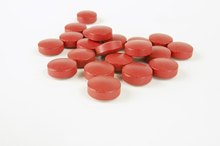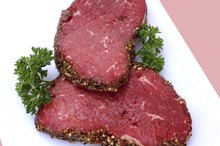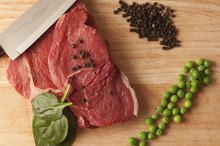Does Iron Deficiency Cause Headaches?
"The Merck Manual Home Health Handbook" describes iron deficiency as one of the most frequent mineral deficiencies in the world 2. It leads to anemia, a condition that develops when your body does not produce enough healthy red blood cells to supply your organs adequately with oxygen. Iron deficiency can cause a range of symptoms, including headaches.
Causes and Risk Factors
Iron deficiency anemia results from low or exhausted iron reserves in your body. In adults, the most common cause is blood loss, either from menstruation or from bleeding in the digestive tract. Deficiency can also result from consuming too little iron in your diet. However, "The Merck Manual" lists low dietary intake as an uncommon cause of iron deficiency in the U.S. because many foods are fortified with iron. Those most at risk for getting too little iron from their diet are vegetarians, infants, young children, teenage girls and pregnant women.
- Iron deficiency anemia results from low or exhausted iron reserves in your body.
- However, "The Merck Manual" lists low dietary intake as an uncommon cause of iron deficiency in the U.S. because many foods are fortified with iron.
Symptoms
Side Effects of Floradix
Learn More
Iron is a critical mineral because it helps produce hemoglobin, a protein that enables oxygen transport within your red blood cells. Insufficient iron supply compromises oxygen delivery to your body’s tissues, including your brain. You may, as a result, experience headaches. Statistically, however, headaches occur less often than other symptoms of iron deficiency anemia, according to the "Harvard Medical School Family Health Guide." More common symptoms include tiredness, lightheadedness, dizziness, shortness of breath and irritability.
- Iron is a critical mineral because it helps produce hemoglobin, a protein that enables oxygen transport within your red blood cells.
- Statistically, however, headaches occur less often than other symptoms of iron deficiency anemia, according to the "Harvard Medical School Family Health Guide.
- "
Sources
According to the "Family Health Guide," food is the best source of iron. However, your doctor may recommend iron tablets or injections to correct a diagnosed iron deficiency. For prevention, eat such iron-rich foods as legumes and beans, red meats, seafood, poultry, eggs or dark green, leafy vegetables. Many cereals and derived products are also enriched with iron. Keep in mind that vitamin E and zinc can reduce iron absorption in your body. In contrast, you can enhance iron absorption by taking apple juice or other vitamin C-rich foods along with your iron supplement.
- According to the "Family Health Guide," food is the best source of iron.
- In contrast, you can enhance iron absorption by taking apple juice or other vitamin C-rich foods along with your iron supplement.
Warning
Facts About Low Potassium & Low Iron
Learn More
Iron deficiency is not the only possible cause of occasional or chronic headaches. If you suspect that you have iron deficiency anemia, do not self-diagnose or self-treat. Rather, consult your healthcare provider for appropriate testing. Excessive supplementation can lead to iron poisoning symptoms within six hours of an overdose, according to "The Merck Manual." Iron overload can damage your liver, intestine or other organs.
- Iron deficiency is not the only possible cause of occasional or chronic headaches.
Related Articles
References
- Harvard Medical School Family Health Guide (1st Free Press Edition); Anthony L. Komaroff, M.D., et al.
- The Merck Manual Home Health Handbook (2nd Edition); Robert S. Porter, M.D., et al.
- None
- Iron deficiency without anaemia is a potential cause of fatigue: meta-analyses of randomised controlled trials and cross-sectional studies - PubMed
- None
- None
- None
- Iron-Deficiency Anemia | NHLBI, NIH
- How we diagnose and treat iron deficiency anemia - PubMed
- Correlation of pallor with hemoglobin levels and clinical profile of anemia in primary and middle school children of rural Telangana | Regina | International Journal of Contemporary Pediatrics
- How we diagnose and treat iron deficiency anemia - PubMed
- Correlation of pallor with hemoglobin levels and clinical profile of anemia in primary and middle school children of rural Telangana | Regina | International Journal of Contemporary Pediatrics
- None
- Iron deficiency anaemia - PubMed
- Is There Any Correlation between Migraine Attacks and Iron Deficiency Anemia? A Case-Control Study
- Iron deficiency anaemia - PubMed
- (PDF) Understanding idiopathic intracranial hypertension: Mechanisms, management, and future directions
- Anemia as an Independent Predictor of Adverse Cardiac Outcomes in Patients with Atrial Fibrillation
- Iron deficiency anaemia - PubMed
- Iron deficiency anaemia - PubMed
- Iron deficiency in chronic heart failure: an international pooled analysis - PubMed
- None
- None
- The Role of Vitamins and Minerals in Hair Loss: A Review - PubMed
- Iron Plays a Certain Role in Patterned Hair Loss
- Oral manifestations and blood profile in patients with iron deficiency anemia - PubMed
- Effects of Iron Deficiency on the Oropharyngeal Region: Signs, Symptoms, and Biological Changes | SpringerLink
- Restless Leg Syndrome: A Neglected Diagnosis
- The prevalence and impact of restless legs syndrome on patients with iron deficiency anemia - PubMed
- Spoon Nails - StatPearls - NCBI Bookshelf
- Spoon Nails - StatPearls - NCBI Bookshelf
- Pica as a manifestation of iron deficiency - PubMed
- Association between iron-deficiency anemia and depression: A web-based Japanese investigation - PubMed
- Iron Deficiency and Risk of Maternal Depression in Pregnancy: An Observational Study - PubMed
- Iron deficiency and susceptibility to infections: evaluation of the clinical evidence - PubMed
- Fatigue and acute/chronic anaemia - PubMed
- Iron deficiency anaemia - PubMed
- Vitamin C (Ascorbic Acid) - StatPearls - NCBI Bookshelf
- Iron Bisglycinate Chelate and Polymaltose Iron for the Treatment of Iron Deficiency Anemia: A Pilot Randomized Trial
- Iron-deficiency anemia | womenshealth.gov
- Iron-Deficiency Anemia | NHLBI, NIH
Writer Bio
Suzanne Fantar has been writing online since 2009 as an outlet for her passion for fitness, nutrition and health. She enjoys researching and writing about health, but also takes interest in family issues, poetry, music, Christ, nature and learning. She holds a bachelor's degree in biological sciences from Goucher College and a MBA in healthcare management from the University of Baltimore.









